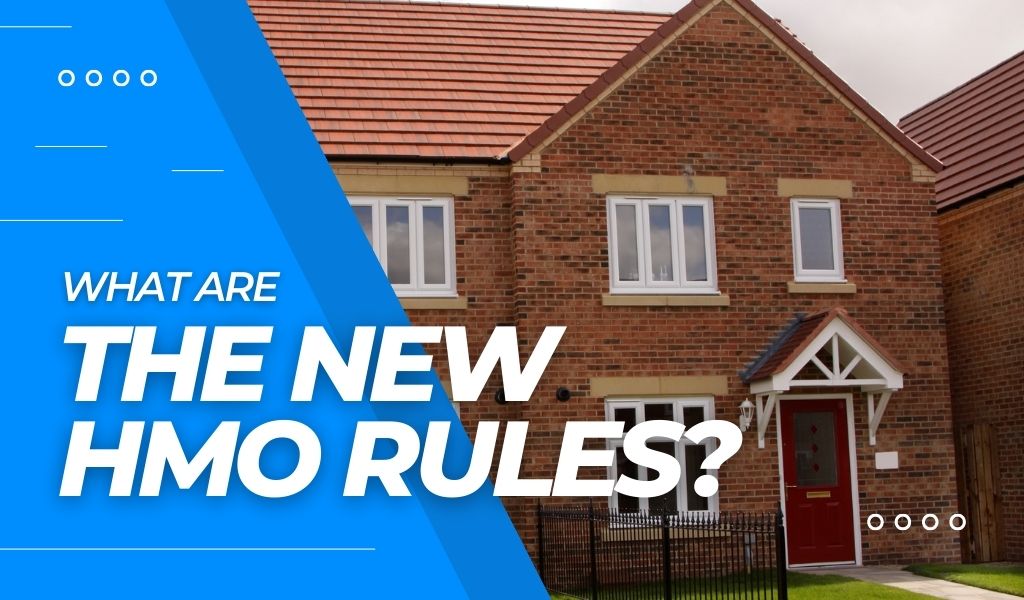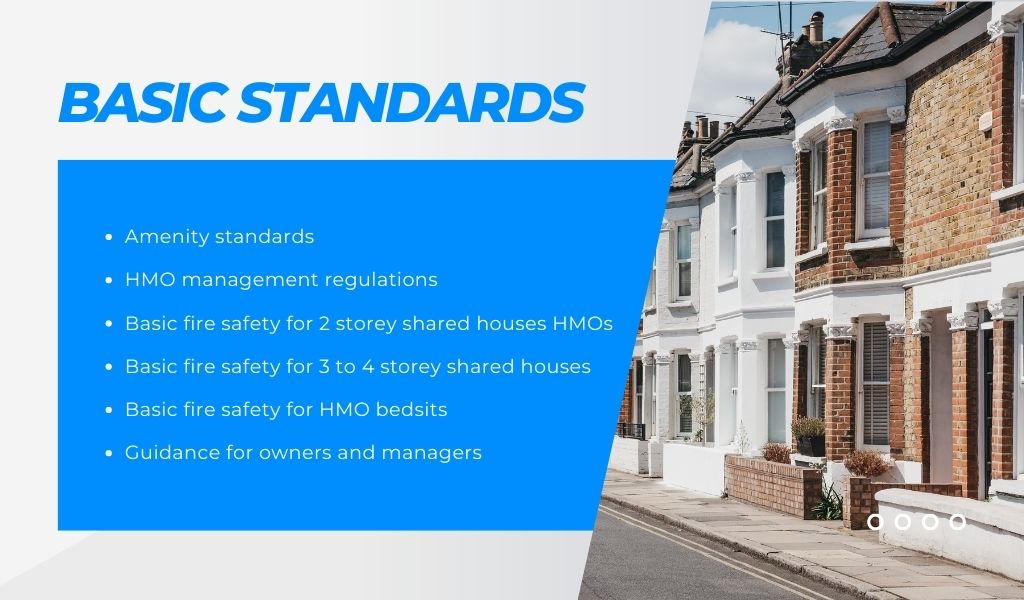Definition of an HMO
Three or more people who together comprise two or more households can rent a building or portion of a building (such as a flat), which is then known as an HMO if one of the following conditions is true. Therefore, this guide will answer the question: what are the new HMO rules UK?
More than one household uses the building, so they share an amenity such as a bathroom, toilet, or kitchen facility. This is a transformed structure and does not totally consist of independent apartments. Regardless of whether there also exists a shortage of amenities or sharing.
The conversion standard dropped below the minimal requirements set forth in the 1991 Building Regulations when they made it up completely of converted self-contained apartments. Additionally, almost one third of the apartments have short leases in place. HMO meaning UK is defined as the following:
To be categorised as an HMO, more than one household must also “occupy a property:
- as their only or main residence
- as a refuge by persons escaping domestic violence
- by students undertaking a full-time course or further or higher education
- for some other purpose that is prescribed in regulations
In addition, HMO requirements UK for household include:
- Families, including single persons and co-habitant couples (whether of the opposite sex)
- Any other relationship that regulation may prescribe. Such as domestic staff or fostering or carer arrangements.

Building Regulations
Houses in Multiple Occupations may additionally be subject to the Town and Country Planning Act 1990 and the Building Regulations 2000 (as Amended).
The installation of additional amenities, conversions and other alterations to an existing HMO may be subject to both Building Regulations and Planning Permission. All new HMO require planning permission.
What are the New HMO Rules UK?
The Government expanded the range of required multiple-occupational housing licences on October 1st, 2018.
No matter how many stories there are, it will apply to certain HMOs where five or more people live in two or more families.
They renovated any HMO housed in a structure or a flat, where the residents lack or share basic amenities like a bathroom, personal laundry facilities, or kitchen facilities.
Furthermore, it applies to purpose-built apartments if one or both apartments are HMOs.
Following tenants fall under the category of household:
- co-habitant couples
- blood- related, or foster families
- carers and domestic staff
Regulations do not class student halls of residence managed by the university and buildings owned by public bodies as HMOs.

Basic Standards
Even if you do not need a licence, your building must meet the following HMO requirements UK:
- Amenity standards
- HMO management regulations
- Basic fire safety for 2 storey shared houses HMOs
- Basic fire safety for 3 to 4 storey shared houses
- Basic fire safety for HMO bedsits
- Guidance for owners and managers
HMO Property Owners’ Responsibilities
The legal responsibilities of a property owner do not change if you own an HMO. These include protecting deposits and meeting energy efficiency rules.
But there are additional obligations for HMO property owners. Among them are the following:
– Provide common spaces and facilities for maintenance and repair services.
– In addition to mains-powered smoke alarms, heat detectors
– Annually doing a gas safety assessment – ensuring that there is enough natural lighting, ventilation, and water supply confirming that there is not an overcrowding on the property
– Renters must have access to sufficient cooking and laundry facilities. For the number of tenants, there should be enough bins available. Performing a fire risk assessment, consult with your council to ensure it is safe; conducting electrical installation checks every five years; making sure that exits are always visible and obvious.

Licensing Obligations
In England and Wales
The property owner must obtain a permit from the neighbourhood council if the building is a large HMO.
Other restrictions state that a room’s floor space cannot be less than 6.51 square metres when used as sleeping space for one person over ten in an HMO. Bedrooms used by two persons over the age of ten need to be at least 10.22 square metres, while bedrooms used by children under ten cannot be any lower than 4.64 square metres. Some councils can have stricter requirements for bedroom dimensions.
Other HMOs may also need to obtain a licence from some municipalities, regardless of how tiny the space is or how few people are renting it. The council will assess the property’s compliance with accepted standards (such as whether it is of an adequate size for the residents and is well-managed) before deciding whether to award a licence. It might also consider whether the property owner is a “fit and proper” man.
There are significant sanctions for non-compliance, therefore if you are a property owner and are unsure whether your HMO has a licence, you should inquire with your local authority.
Although some councils issue licences for shorter periods of time, the average licence is valid for five years.
In Scotland
In Scotland, the property owner must licence all HMOs. You risk receiving a fine of up to £50,000 if you rent out an illegal HMO property. The local council issues HMO licences, and it will perform several checks prior to doing so, including:
- That you are “fit and proper” to hold a licence (i.e., no criminal convictions for fraud or theft); that you manage the property properly (i.e., you carry out your obligations as a property owner and respect the tenants’ legal rights); and that you follow all applicable laws.
- That the property meets the HMO standards (e.g., the bedrooms must be of adequate size, the property should be secure and adequate fire safety and security measures must be in place)
The typical length of a licence is three years, and you must renew it before it expires.

What if you Fail to Comply with Licensing Requirements?
If and when you break licencing laws in England and Wales, you risk paying a fine and will need to pay back up to a year’s worth of rent. Issuance of a rent repayment order takes place. Additionally, a section 21 notice to repossess property will be invalid if an HMO requires a licence, but you, the property owner, do not hold one. There exists no scheme on how to avoid HMO licence.
A $10,000 fine is possible in Scotland for violating licencing regulations. Also, suspension of your licence is possible, and you must then rectify the property’s issues.
Apply for a Licence
The holder of an HMO licence must renew it once five years have passed to remain in operation.
If the property is not required to obtain a licence for the following three months, temporary licencing exemptions can be applicable.
New HMO licence register must include additional information.
When submitting new applications, please include more details. You might not have to provide this degree of specificity when renewing a licence unless anything has changed.
You must complete the application form, pay the necessary fee, submit all the current safety certifications and documentation stated below, and present gas even if they do not connect it to the building for your application to be accepted.
The council may pursue legal action for failure to HMO licence register if you do not complete the application process at the required level.
- to scale or proportion building floor plans
- a current copy of the certificate (s) of inspection and testing for automatic fire detection
- a current copy of the Gas Safety Inspection and Test Certificate (s) and the Emergency Lighting Inspection and Test Certificate (s)
- a current copy of the Fire Risk Assessment
- a copy of the Electrical Installation Inspection and Test Certificate (s).
As you fill out the form, you will need to upload certificates, so prepare them.
You Should Work with a Specialist HMO Mortgage Broker
It is difficult to understand what are the new HMO rules UK as HMOs are not an exception to the trend of increased complexity in buy-to-let mortgage legislation in recent years. Property owners could pay hefty fees in vain if they apply to the wrong lender. HMO mortgage brokers use the entire market, so they can likely help property owners traverse this complex field and discover the most reasonably priced product to fulfil their needs while also saving them time and money.
Mortgages for HMOs are not popular among all lenders; many of those who do lend fall into the category of “specialist” lenders.
They permit the broker to represent the customer with some specialised HMO lenders.
Typically, HMO mortgages have more intricate charge schedules. A broker will evaluate the best deal for you, taking these factors into account.
An HMO mortgage broker will be able to identify the best lender because they have the requisite knowledge, expertise, and direct contact skills.
To save the applicant time and effort, brokers will be able to cooperate with the lender to “package” the documents needed for the case.


